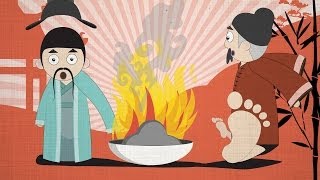(单词翻译:单击)
Everybody loves fireworks -- the lights, the colors, and, of course, the big boom.
每个人都喜欢烟花,喜欢华光熠熠,也喜欢色彩缤纷,当然也喜欢绽放时的响声。
But the history of fireworks isn't all hugs and celebrations.
但烟花的历史并没有像烟花那么灿烂。
Long before epic fireworks displays, chemists in China invented the key ingredient that propels those bright lights into the sky.
在有烟花记载的很久以前,中国的化学家门发明了一种重要的物质,这种物质驱动着亮光冲向天空。
That invention was what we now call gunpowder.
这种发明就是我们现在所称的火药。
Our story begins back in ancient China in the mid-ninth century
故事起源于古老的中国,在九世纪中期,
where early Chinese alchemists were trying to create a potion for immortality.
当中国早期的炼金者尝试着制造长生不老药时。
Instead, what they created was a flammable powder that burned down many of their homes.
他们意外地发明了一种易燃的粉末物质,这种易燃物质烧掉了很多人们的房屋。
They quickly realized that this black powder, which they called fire medicine,
他们很快意识到这种被他们叫做火药的黑色粉末
was precisely the opposite of something that would make you live forever.
恰恰与他们日益追求的长生不老药背道而驰。
In these early days, the Chinese hadn't yet figured out how to make the powder explode;
在最开始的这个时期,中国人还没有找到使粉末爆炸的方法,
it was simply very flammable, and their armies used it to make flaming arrows and even a flamethrower.
知道的只是这种黑粉非常易燃,所以那时中国的军队使用这种黑粉来制造烟焰火箭支,甚至喷火器。
But once they figured out the right proportions of ingredients to create a blast, they began using the powder even more,
但是当他们研究出能够制造爆炸所需的物质的比例时,他们开始更多地使用火药,
creating fireworks to keep evil spirits away and bombs to defend themselves against Mongol invaders.
来制造烟花用来驱赶恶魔,以及制造炸弹用来抵挡蒙古的入侵者。
It was these Mongols, most likely, who spread the invention of gunpowder across the world.
大概是这些蒙古人将火药传播到了世界各地。
After fielding Chinese attacks, they learned how to produce the powder themselves
在与中国交战的过程中,蒙古人学会了怎样生产火药,
and brought it with them on their conquests in Persia and India.
而且用火药征服了波斯和印度。

William of Rubruck, a European ambassador to the Mongols, was likely responsible for bringing gunpowder back to Europe around 1254.
威廉·鲁不鲁乞,欧洲派往蒙古的一名使者,于1254年把火药带回了欧洲。
From there, engineers and military inventors created all kinds of destructive weapons.
正是从那时起,工程师和军事发明家发明创造了各种各样具有破坏性的武器。
From bombs to guns to cannons, gunpowder left its mark on the world in some pretty terrible ways,
从炸弹到枪再到大炮,火药遍布于世界各地,留下的是令人畏惧的痕迹,
in contrast to the beautiful marks it can leave in the air.
而不是漫天华彩。
So, how does black powder propel fireworks into the sky?
那么,火药是怎样驱使烟花飞向天空的呢?
You might have seen old Westerns or cartoons where a trail of gunpowder is lit and it leads to a large and obviously explosive barrel.
你或许在旧时西部电影或动画片中看到过,当一根火药线被点燃,就会引向一个巨大的并可爆的桶。
Once the fire gets to the barrel, a large boom occurs.
一旦火进入了这个桶,爆炸就会发生。
But why doesn't the trail itself explode?
但是,为什么这根火药线自己不爆炸呢?
The reason is that burning the powder releases energy and gases.
这是因为火药燃烧的时候会释放能量和气体。
While the trail is burning, these are easily released into the surrounding air.
当这根火药线燃烧的时候,这些能量和气体自然地散放到了周围的空气中。
But when the gunpowder is contained within the barrel, the energy and gases cannot easily escape and build up until BOOM!
但一旦火药进入封闭的桶,这些能量和气体不能散开,堆积起来直到发生爆炸。
Firework canisters provide a single, upward-facing outlet to channel this explosive energy.
烟花筒上有一个朝上的单向出口,可以输送这股爆炸的能量。
The wick ignites the gunpowder and the energy takes the easiest exit from the canister, launching the firework high into the sky.
当火药芯被点燃,能量就自然地从烟花筒里释放,推动烟花升向天空。
The flame then makes its way through the firework's encasing and the same reaction occurs high above our heads.
火焰冲破烟火的层层包围,在天空中完成了同样的反应。
So, while the Chinese alchemists never found the compound for eternal life,
所以说,虽然中国的炼金者没有找到长生不老的灵丹妙药,
they did find something that would go on to shape all of civilization,
他们却找到了铸成人类文明道路的东西--火药,
something that has caused many tragic moments in human history,
人类历史中的火药造成了许多悲剧,
and yet still gives us hope when we look up in celebration at the colorful night sky.
但同时给予我们希望,因为当我们仰望星空时,也能看到黑夜的五彩斑斓。


